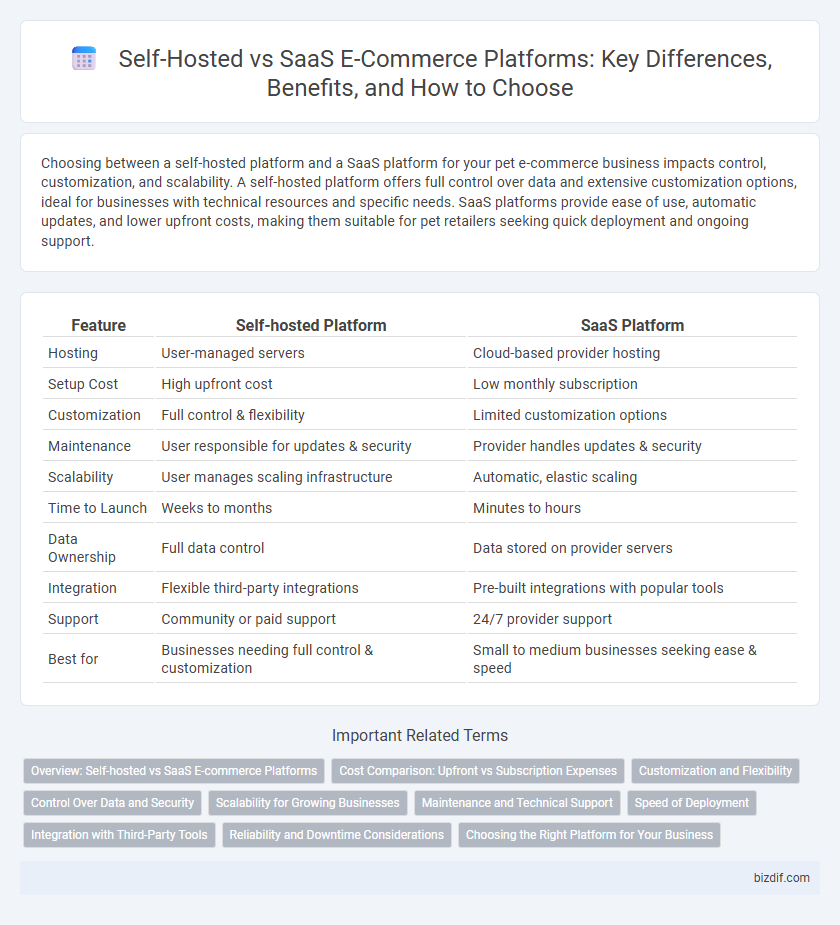Choosing between a self-hosted platform and a SaaS platform for your pet e-commerce business impacts control, customization, and scalability. A self-hosted platform offers full control over data and extensive customization options, ideal for businesses with technical resources and specific needs. SaaS platforms provide ease of use, automatic updates, and lower upfront costs, making them suitable for pet retailers seeking quick deployment and ongoing support.
Table of Comparison
| Feature | Self-hosted Platform | SaaS Platform |
|---|---|---|
| Hosting | User-managed servers | Cloud-based provider hosting |
| Setup Cost | High upfront cost | Low monthly subscription |
| Customization | Full control & flexibility | Limited customization options |
| Maintenance | User responsible for updates & security | Provider handles updates & security |
| Scalability | User manages scaling infrastructure | Automatic, elastic scaling |
| Time to Launch | Weeks to months | Minutes to hours |
| Data Ownership | Full data control | Data stored on provider servers |
| Integration | Flexible third-party integrations | Pre-built integrations with popular tools |
| Support | Community or paid support | 24/7 provider support |
| Best for | Businesses needing full control & customization | Small to medium businesses seeking ease & speed |
Overview: Self-hosted vs SaaS E-commerce Platforms
Self-hosted e-commerce platforms offer full control over customization, security, and data management by hosting the software on private servers, making them ideal for businesses with specific technical requirements. SaaS e-commerce platforms provide a cloud-based, subscription model with easy scalability, regular updates, and lower upfront costs, appealing to small and medium-sized businesses seeking simplicity. Choosing between the two depends on factors such as budget, technical expertise, security needs, and desired level of control.
Cost Comparison: Upfront vs Subscription Expenses
Self-hosted e-commerce platforms require significant upfront investment for server infrastructure, software licenses, and technical setup, leading to higher initial costs compared to SaaS platforms. SaaS platforms operate on a subscription model, distributing costs monthly or annually, which reduces upfront expenses but may incur higher cumulative fees over time. Businesses must evaluate total cost of ownership, including maintenance and scalability, to determine whether immediate capital expenditure or predictable subscription fees align better with their financial strategy.
Customization and Flexibility
Self-hosted e-commerce platforms provide extensive customization options, allowing businesses to modify code and tailor functionality to specific needs, which enhances flexibility in integrating unique features and third-party tools. SaaS platforms offer limited customization confined to pre-built templates and plugins, simplifying updates and maintenance but restricting deep modifications. For companies requiring full control over user experience and unique capabilities, self-hosted solutions deliver superior adaptability compared to SaaS alternatives.
Control Over Data and Security
Self-hosted e-commerce platforms offer complete control over data storage and security configurations, allowing businesses to implement customized safeguards and compliance measures tailored to their specific needs. SaaS platforms, while providing built-in security protocols and regular updates managed by providers, limit direct access to underlying data and rely on third-party infrastructure, which may introduce concerns over data ownership and vulnerability exposure. Choosing between self-hosted and SaaS solutions requires evaluating the trade-offs between autonomous data governance and convenience-driven, provider-managed security frameworks.
Scalability for Growing Businesses
Self-hosted e-commerce platforms offer complete control over scalability, allowing businesses to customize server resources and handle increasing traffic spikes independently. SaaS platforms provide automatic scaling, ensuring seamless performance during growth without requiring technical expertise or infrastructure management. Choosing between the two depends on a company's need for control versus convenience during expansion phases.
Maintenance and Technical Support
Self-hosted e-commerce platforms require businesses to manage their own maintenance, including server updates, security patches, and bug fixes, demanding dedicated technical expertise and resources. SaaS platforms provide automatic maintenance and continuous technical support, ensuring system reliability and freeing merchants from infrastructure management. Opting for SaaS reduces downtime risks and allows focus on core business activities through professional, round-the-clock support services.
Speed of Deployment
Self-hosted platforms require extensive setup time due to hardware, software installation, and configuration demands, often delaying store launch by weeks or months. SaaS platforms provide rapid deployment with pre-configured environments, enabling e-commerce businesses to go live within hours or days. Faster speed of deployment on SaaS platforms supports quicker time-to-market and agility in responding to consumer trends.
Integration with Third-Party Tools
Self-hosted e-commerce platforms offer extensive customization and allow seamless integration with a wide range of third-party tools, providing full control over data and workflows. SaaS platforms typically provide built-in integrations and app marketplaces, enabling faster deployment but may limit flexibility with external tools. Choosing between the two depends on specific business needs for customization, control, and ease of integration with marketing, payment, and logistics solutions.
Reliability and Downtime Considerations
Self-hosted e-commerce platforms offer full control over server configuration, enabling optimization for maximum reliability but require constant monitoring and manual updates to prevent downtime. SaaS platforms provide robust infrastructure with automated maintenance and built-in redundancy, minimizing downtime through proactive failover systems and 24/7 support. Evaluating the trade-offs between control and managed uptime is crucial for businesses aiming to maximize e-commerce platform reliability.
Choosing the Right Platform for Your Business
Choosing the right e-commerce platform hinges on factors such as control, scalability, and budget. Self-hosted platforms offer full customization and ownership, ideal for businesses needing tailored functionality and complete data control. SaaS platforms provide ease of use, lower upfront costs, and maintenance handled by providers, making them suitable for startups and small businesses prioritizing quick setup and operational simplicity.
Self-hosted Platform vs SaaS Platform Infographic

 bizdif.com
bizdif.com